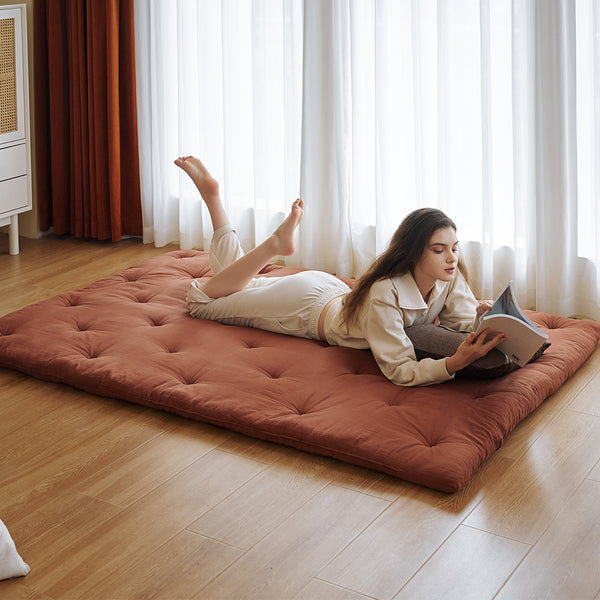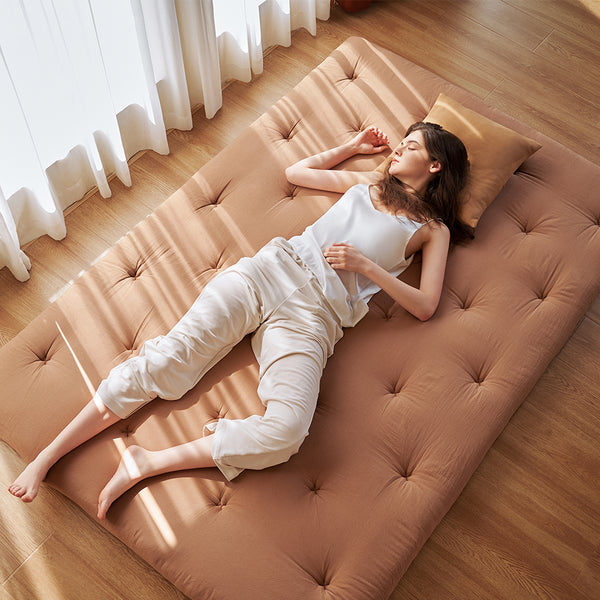Have you ever pondered the phrase "Which direction should you sleep"? The question blends ancient theories with modern science, and the answer might significantly impact your health and well-being.
This comprehensive guide delves into the various aspects of this intriguing topic, offering insights into how the direction in which you sleep can affect your physical and mental health.
Which Direction Should You Sleep: Understanding Its Significance
The Southward Sleep Theory
Ancient traditions across various cultures, coupled with contemporary scientific research, suggest that orienting your sleep with the head towards the south and feet towards the north may benefit your overall sleep quality and health. This recommendation is not mere folklore but underpinned by geomagnetism principles.
The Earth's magnetic field, a natural phenomenon, is believed to interact with the body's magnetic field when aligned in this manner. This theory supports animal behavior studies, as referenced by the National Library of Medicine, showing that certain species instinctively align their bodies north-south while resting.
Science Behind the Southward Orientation
Several studies, including those referenced by the National Library of Medicine, have observed that animals tend to align north-south while resting. Humans sleeping in a southward direction have improved sleep quality and reduced blood pressure.
The Earth's magnetic field could play a role in this phenomenon, although further research is needed to understand these effects fully. The magnetic field influences the human body similarly to animals, providing a more restful and healthful sleep orientation.
However, it's important to note that more extensive and conclusive studies are required to establish these findings.
Improving Sleep Quality Beyond Direction
When considering the best sleeping direction, it's also essential to create an environment conducive to restful sleep. Integrating carefully chosen sleep accessories can play a pivotal role in creating the ideal sleep environment.
Products like the Zonli Temp-Controlled Faux Fur Weighted Eye Pillow are designed with this holistic approach. The plush faux fur and skin-friendly bamboo cover are luxurious and comforting.
At the same time, the gentle pressure from the 120g clay beads offers a unique relaxation experience, mimicking the sensation of a calming, soft touch. It can be beneficial for those who struggle with insomnia, stress, or anxiety, as it aids in creating a serene atmosphere conducive to sleep.
Examining Common Sleep Direction Questions Scientifically

Is it Harmful to Sleep in Other Directions?
While the southward sleeping direction is recommended based on ancient wisdom and some scientific studies, sleeping in other directions isn't necessarily harmful. However, many experts advise against sleeping with your head towards the north due to potential tension and health issues.
This belief is rooted in the idea that such an alignment conflicts with the Earth's magnetic field, possibly leading to bodily disturbances. It's essential to consider individual comfort and sleep quality as paramount. If sleeping in a particular direction causes discomfort or restlessness, it may not suit you.
Is There a Scientifically Best Direction to Sleep?
Whether there's a scientifically best direction to sleep is a fascinating one that intersects cultural beliefs and scientific inquiry. While current scientific studies do not conclusively endorse a specific direction for sleeping, various cultural and traditional practices have long-held beliefs about optimal sleeping orientations.
How Do I Choose Between South and East Sleeping Directions?
It can be helpful to experiment to determine which direction works best for you. Spend a few weeks sleeping in each direction and observe any changes in your sleep quality, mood, energy levels, and overall well-being. This empirical approach allows you to personally assess the impact of these traditional beliefs on your own sleep experience.
Can the Design of My Bedroom Affect My Sleep?
Absolutely. The design and layout of your bedroom can significantly impact your sleep quality. According to ancient beliefs, the placement of your bed, the color scheme of your room, and the amount of clutter can all influence the energy in your bedroom.
A well-arranged bedroom that promotes a calming and relaxing environment can help reduce stress and enhance sleep quality. It's recommended to have a bed placed in a position where you feel secure but not directly in line with the door.
Colors that are soothing and resonate with you can also contribute to a more restful sleep environment. Removing clutter and electronic devices can minimize distractions and create a more peaceful setting conducive to sleep.
Can the Material of Bedding Impact Sleep Quality?
Yes, the material of your bedding can significantly impact sleep quality. Materials that regulate temperature and wick away moisture contribute to a more comfortable sleep environment, which can improve sleep quality.
Natural fibers, like cotton and bamboo, are often recommended for their breathability and moisture-wicking properties. In the context of the Zonli Eye Pillow, the bamboo cover is designed to provide comfort and regulate temperature, enhancing the overall sleep experience.
Are There Any Long-Term Health Risks Associated with Incorrect Sleep Orientation?
Currently, limited scientific evidence suggests that long-term health risks are directly associated with specific sleep orientations.
While specific orientations like head-north may be less advised due to potential geomagnetic disturbances, the direct long-term health consequences still need to be conclusively established. The focus should primarily be on ensuring overall sleep quality, which includes factors like comfort, duration, and uninterrupted sleep.
Are There Other Benefits to Sleeping Southward?
While the primary benefits of sleeping in a southward direction are improved blood pressure and sleep quality, there may be additional advantages. Aligning with the Earth's magnetic field could enhance cognitive functioning and emotional well-being.
This orientation also helps reduce the time to enter the rapid eye movement (REM) sleep phase, which is crucial for cognitive functioning and overall health. However, it's important to note that scientific research in this area is still evolving, and more studies are needed to confirm these additional benefits.
What If I Can't Align My Bed in the Recommended Directions?
If aligning your bed in the recommended South or East directions is not practical due to space constraints or other reasons, there are still many ways to optimize your sleep environment. Prioritizing other aspects of sleep hygiene can substantially impact your sleep quality. Ensure your bedroom is dark, quiet, and cool. Invest in a comfortable mattress and pillows that support your body well.
Integrating sleep aids such as the Weighted Eye Pillow can be particularly beneficial. The eye pillow's gentle pressure helps reduce stress and promote relaxation, aiding in faster sleep onset and improved sleep quality.
Are There Other Ways to Improve Sleep Quality Besides Sleeping Direction?
Absolutely! Improving sleep quality extends beyond the direction in which you sleep. A consistent sleep schedule helps regulate your body's internal clock, making it easier to fall asleep and wake up naturally. Creating a comfortable and conducive sleep environment is also critical. It includes room temperature, minimal light and noise, and comfortable bedding.
Conclusion
So, which direction should you sleep? This inquiry directly impacts your health and well-being. While the southward orientation is recommended based on ancient beliefs and some scientific studies, integrating products like eye pillows can enhance your sleep experience.
Remember, combining the right direction, environment, and additional accessories is a holistic approach to sleep that can improve sleep quality and overall health.



